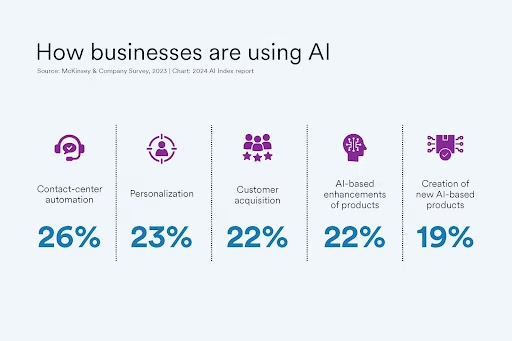AI-powered solutions are the future of digital business because they automate workflows, improve customer experiences, and deliver data-driven insights at scale. In 2025, companies using AI tools will grow faster, reduce costs, and stay ahead of competitors.

Table of Contents
ToggleThe Common Question: Why Invest in AI Now?
One question many business owners ask is: “Why should I use AI when my current digital tools are working fine?”
The short answer is: traditional tools only execute instructions, while AI adapts and learns. AI doesn’t just follow rules—it analyzes patterns, predicts outcomes, and improves over time.
For instance:
- An AI chatbot can resolve most customer issues instantly.
- AI-driven marketing engines personalize offers in real time, boosting sales.
- Predictive tools help businesses forecast demand and prevent costly mistakes.
Simply put, AI helps businesses do things faster, smarter, and with fewer resources.
Key Benefits of AI-Powered Solutions
1. Automation at Scale
AI can handle repetitive tasks—like invoice processing, report generation, or fraud detection—without human intervention. This reduces errors and frees employees to focus on creative problem-solving.
2. Data-Driven Decisions
AI-powered dashboards go beyond charts. They highlight insights, uncover risks, and even recommend actions. Decision-makers can act with confidence instead of relying on guesswork.
3. Personalized Customer Experiences
Customers now expect tailored experiences. AI tools power recommendation engines, dynamic pricing, and personalized ads—making users feel valued and understood.
4. Cost Reduction
AI optimizes resources, prevents errors, and increases efficiency. From supply chains to digital ads, businesses cut costs while improving performance.
5. Competitive Edge
In 2025, speed matters. Companies using AI respond faster to trends, deliver better service, and adapt quickly—leaving slower competitors behind.

How to Use AI Tools in Your Business
If you’re wondering how to use AI-powered tools, start with small steps:
- Customer Support: Add a chatbot to answer FAQs and integrate it with your CRM.
- Sales & Marketing: Use AI for customer segmentation and personalized email automation.
- Operations: Apply predictive analytics for demand forecasting and workforce scheduling.
👉 Many platforms now offer an easy AI integration tutorial, with drag-and-drop workflows. No advanced coding is required, making AI accessible even to small businesses.

Best Practices for AI Adoption in 2025
- Define Clear Goals: Focus on solving one pain point first—like improving customer retention.
- Maintain Data Quality: AI depends on accurate, updated data.
- Balance Human + AI: Let AI handle repetitive tasks while humans lead strategy and innovation.
- Stay Compliant: Follow new AI ethics and regulations arriving in 2025.
- Track ROI: Measure cost savings, customer satisfaction, and efficiency improvements.
These best practices for AI adoption in 2025 ensure that businesses don’t just use AI, but use it effectively.
Misconceptions About AI in Business
- “AI replaces jobs.”
False—AI complements human work. It handles repetitive tasks, leaving humans for strategic and creative roles. - “AI is too costly.”
In reality, cloud-based AI tools have affordable subscription models, accessible even for startups. - “AI is only for tech giants.”
Today, industries like healthcare, retail, logistics, and even restaurants use AI for efficiency and customer engagement.
Why 2025 Is the Turning Point
With the rise of voice search, AI-powered snippets, and zero-click results, businesses that adopt AI will dominate visibility online. Just as websites became essential in the 2000s and social media in the 2010s, AI is now the defining factor of digital success in the 2020s.
Ignoring AI in 2025 is like ignoring the internet in 2005—it’s no longer optional.
Final Thoughts
AI-powered solutions are not just a technology trend—they are the foundation of the modern digital business. They enable automation, personalization, and smarter decision-making that keeps companies future-ready.
Author
Muhammad Abdul Manan is a full-stack web developer, Laravel expert, and founder of The Prime Studio. He builds scalable websites and modern web apps with Laravel, ReactJS, Tailwind CSS, and VueJS.
- Show All
- AI in Business
- Artificial Intelligence
- Brand Strategy
- Branding
- Content Marketing
- Conversion Optimization
- Digital Marketing
- Frontend Development
- Google SEO
- Influencer Marketing
- Off-Page SEO
- On-Page SEO
- SEO
- SEO Strategies
- Social Media Marketing
- Startup Growth
- Storytelling & Positioning
- UI Trends
- User Experience (UX/UI)
- UX Design
- Visual Identity
- Web Development
- Website Optimization
The Role of UI/UX in Boosting Conversion Rates in 2025
Modern UI/UX design in 2025 is more than aesthetics—it’s the key to higher conversions. Learn how frictionless, mobile-first, and personalized...Why AI-Powered Solutions are the Future of Digital Business
AI-powered solutions are transforming digital business in 2025 by automating workflows, personalizing customer experiences, and enabling smarter, data-driven decisions. Companies...
Transform Your Idea into a Stunning Brand – How We Do It at ThePrimeStudio.com
Are you ready to take your business to the next level? Transform your idea into a stunning brand with our...
Proven Strategy to Rank on Google in 24 Hours: Real SEO Tips for 2025
Learn proven SEO tricks to help your aged domain rank on Google in under 24 hours. Includes technical audit tips,...
